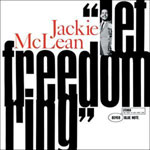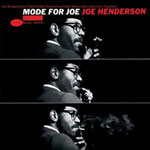Freedom And Formality
| |
|
A new Blue Note quartet has appeared; it features Jackie McLean on alto sax, Joe Henderson on tenor, Lee Morgan on trumpet and Bud Powell on piano. This would make an unusual band if they ever played together, I’m sure you agree. Unless, of course, you don’t know who the hell they are anyway, in which case, I’m talking about a music called jazz and four CD reissues. People have been asking what jazz is, what it’s about, and how it’s defined since…forever, probably, or at least since early last century. In the early-60s, when McLean made Let Freedom Ring, old definitions were being challenged and Jackie, inspired by Ornette Coleman, went for something else too. The question, kids, is: do you prefer the structural or post-structural approach? I mean, how does it sound, all this squealing and running around? Is it aimless, or pointless, or an essential outburst of artistic freedom? I don’t think Jackie quite had whatever it takes to deal with all that open space. Few people had, or have, but that doesn’t stop them trying, of course, as is their right. But is there any worse sound in the world (aside from most pop, Japanese thrash, Improv, so-called R&B, and everything else I detest) than a player lost in the wilds of his limitless ego – just blowing for what feels like eternity, without end, without logic, or reason, or purpose or meaning or means of resolving what the hell he has started other than to squeal or grunt and go on until collapsing in a heap of half-baked ideas? Eh? I don’t think so. You know, I’m not saying Jackie’s that bad. He isn’t, although thirteen minutes-plus of ‘Little Melonae’ does, to my ears, perform the unwelcome trick of stretching time, which is no mean feat. I reckon, though, that we’re supposed to be so thrilled by his use of newfound freedom that time flies, rather than drags. In the best music time flies, doesn’t it? I think so. Some of my favourite Blue Note tracks, despite being on average over six minutes long, fly by and feel, psychologically, like a Ramones tune. They create a rush. Having tried to enjoy this album a few times the only the only rush is me searching for the remote. Call me old-fashioned, and lazy. The title track of Lee Morgan’s Search For The New Land is over fifteen minutes long but is structured in such a way as to make time fly, or at least pass pleasantly. Everyone solos in a neat and tidy order, and everyone is understated when they play, which I like. Morgan, Shorter, Hancock and Green (that’s Grant) behave impeccably and sound, no less, like pioneers crossing the great plains of American jazz with a view to settling peacefully rather than starting fights and acting weird, like some other travellers of the near future. Hell, some of them even got to Africa and made Ju Ju music and went a bit crazy – ‘The horror!’ screamed listeners as they witnessed the new art of blackness. Lee had to wait two years for this album to be released because ‘The Sidewinder’ success had to be milked for all it was worth. His ‘new land’ was politically allegorical rather than musical. That’s fine by me. Also, as a big bonus here, there’s ‘Mr Kenyetta’, a Blue Note tune of classic stature if, like me, you love that sound - kind of hot, kind of funky, catchy as hell. All round it’s a good album. Seven was a crowd at Joe Henderson’s Mode For Joe session but his writing, along with Cedar Walton’s, made for a set of strong tunes. Six tracks could have been cut down to four longer ones, perhaps, but then that wasn’t how they were intended, obviously. The limits of freedom to expand can sometimes be frustrating. Take Walton, who only gets going thirty seconds before the end of the title track before it all fades away. Then again, what Joe does a few times is staggering, appearing to have crash landed from an off-world trip whilst still playing. Joe was a total player really, capable of abstraction, melody and gruff lyricism. The killer is ‘Caribbean Fire Dance’, which crackles with energy from drummer Joe Chambers, whilst Lee Morgan blazes in to match Henderson’s heat with his own. Limitations and all, it’s still a damn fine album. Then there was Bud Powell, in 1958, and The Scene Changes.
Of course it does/did, and the seeds he sowed with the rest of the crazy
bop gang after
the war were about to produce some very strange fruit in the following ten
years. This may not be his best work, but he could still run anyone ragged
over the eighty-eights, and write brilliant melodies like ‘Cleopatra’s Dream’. ‘Comin’ Up’ may be too long at over seven minutes, but I love Art Taylor’s skeletal mambo and Paul Chambers’ funky foundation. Bud sounds like a supper-club nightmare – fantastic.
He would leave for Paris the following year. Yes, the scene changed, but only
a fool would forget what he did, or dismiss what he was capable of, even at
this late stage. © 2003Robin Tomens |



